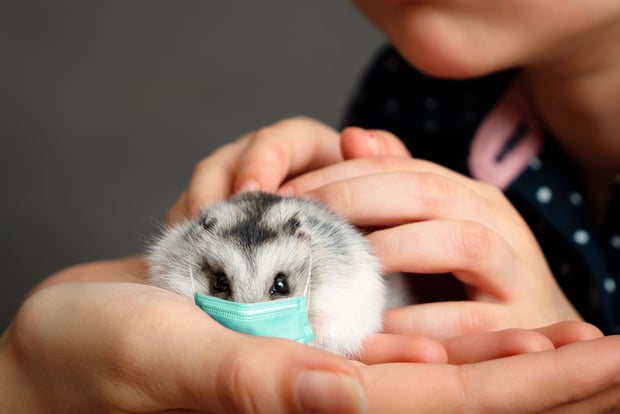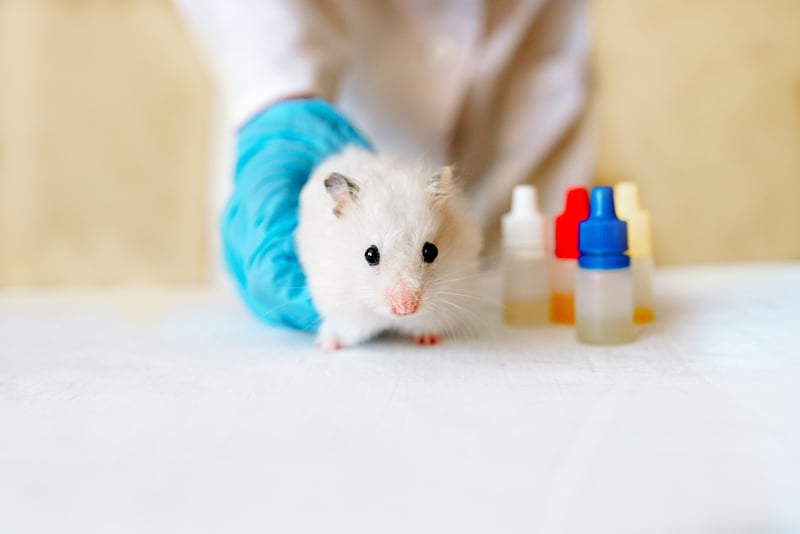I once heard someone say the world is divided into vaxxers and anti-vaxxers, and each party is waiting for the other to die (hopefully neither!). Thankfully, the ethics and politics of animal vaccines are less controversial; animal vaccination protocols are widely regarded as a central tenet of good animal husbandry. With that in mind, what shots will your hamster need?
Hamsters do not need routine immunoprotective shots (vaccinations); however, veterinarians may treat sick hamsters with injectable medicines. Veterinarians may administer injectable medications subcutaneously (i.e., under the skin) or intraperitoneally (i.e., into the abdomen).
One of the first concerns for any hamster owner is, how do I keep my hamster healthy? What shots will my hamster need, and when do they need them?
Table of Contents
Do Hamsters Need To Get Routine Immunoprotective Shots?
Before we delve into whether your hamster needs shots, it’s essential to clarify the terminology of medical shots.
Most people use the term “shots” interchangeably with “injection,” with a slight bias towards vaccination injections.
Vaccinations refer to any product which challenges the host’s immune system and triggers a partial or complete immunoprotection against a specific antigen. A more straightforward way of saying this is: vaccines prepare the host’s body to fight particular diseases in the future.
Vaccines may be administered via injection (shots), nasal spray, pills, or liquid. However, the overwhelming majority of animal vaccines are administered via injection.
Most animals whose lives are intertwined with humans will be subject to a mandatory vaccination schedule; this includes all commercial animals and most companion animal species.
The one companion species exempt from mandatory vaccinations is hamsters. There is no compulsory vaccination protocol for hamsters, and there are no hamster-specific vaccinations currently on the market.
Veterinarians will refuse (rightly so) to vaccinate a hamster with a product designed for cats and dogs.
Do Hamsters Carry Diseases?
When people ask, “do hamsters carry diseases,” the subtext is, “can I catch a disease from a hamster?”

Hamsters, like humans, can carry a variety of diseases. However, not all hamster-carried diseases are a human health concern.
For example:
- Your hamster may become infected with and carry Tyzzer’s disease. However, this disease is not considered a threat to human health.
- By contrast, Lymphocytic Choriomeningitis Virus (Arenavirus) Infection (LCMV) can be passed from the hamster to human handlers.
In both cases, hamsters are carrying diseases, but only the second example presented a threat to human health. Diseases that spread from an animal host (e.g., hamster) to humans are called zoonotic diseases.
Common zoonotic diseases that can spread from hamsters to people include:
- Lymphocytic Choriomeningitis Virus (Arenavirus) Infection (LCMV)
- Salmonellosis
- Pseudotuberculosis
- Tularemia
Humans can also become infected with the parasitic ringworm and tapeworm if working with hamsters infected with ringworm or tapeworm. The risk of parasitic infection is why it is essential to deworm your hamster regularly.
Can Hamsters Get Rabies?
Thanks to Hollywood’s terrifying portrayal of rabies-infected animals, most people are aware of the severe consequences of rabies infection.
The rabies virus is transmitted between hosts when the infected animal’s saliva or brain tissue makes direct contact with the uninfected person’s:
- Broken skin
- Eye, nose, and mouth mucous membranes.
In warm-blooded animals, like a hamster, the rabies virus causes severe encephalitis (i.e., brain swelling), with a rapid decline in central nervous system functions and eventually death.
Theoretically, all warm-blooded mammals, including hamsters, could be infected with the rabies virus, but a small (pun intended) group of animals appear to be relatively infection-free.
The Centre of Disease Control (CDC), John Hopkins Hospital, and the New York Department of Health all agree that the incidence of rabies infection in hamsters is so low as to be negligible. There have been no documented cases of wild-caught or pet hamsters having rabies.
Scientists have deliberately infected Syrian hamsters with rabies to study how their immune systems respond to the viral challenge. The experiments proved that hamsters could get rabies, but they could not explain why infection rates in wild hamsters are statistically insignificant.
Do Hamsters Need Rabies Shots?
Due to the low incidence of rabies infection in hamsters, most veterinarians consider a prophylactic rabies vaccine unnecessary. However, the CDC recommends that any hamster attacked by a rabies-infected animal be immediately taken to a vet.
Always handle the injured animal with protective clothing, e.g., gloves. If the injured hamster has been infected, the infection could transfer to you if you have an open wound or if the hamster rubs against your eyes, nose, or mouth.
Depending on the severity of injuries, the veterinarian may either:
- Recommend euthanasia
- Treatment of injuries, post-bite prophylactic vaccinations, and rabies-isolation protocol.
Rabies-isolation protocol requires the veterinarian to isolate your hamster for 10 days. If your hamster has no clinical symptoms after 10 days, it will be free to come home.
Do Hamsters Need To Be Seen By A Vet?
Hamsters will need to go to the vet once a year for an annual check-up. The yearly check-up allows your veterinarian to:
- Do a general health check and treat issues before they become a problem.
- Establish a baseline for your hamster’s health, which helps your veterinarian treat your hamster if they become sick in the future.
Owners should always take sick hamsters to veterinarians for evaluation and treatment. The earliest signs of illness in a hamster are often linked to changes in behavior, e.g., an energetic hamster who suddenly refuses to come out of the house and sleeps all the time.
Other signs of illness in your hamster can include:
- Lethargy and general inactivity
- Weight loss and lack of appetite
- Hunched posture
- Abnormal gait
- Scruffy, dull, or broken coat with or without hair loss
- Diarrhea which may be identified as a wet tail
- Trouble breathing
- Discharge from the eyes, ears, and nose
Can A Sick Hamster Get Shots?
When you take your sick hamster to the veterinarian, the veterinarian may decide to treat your hamster with injectable medication.
Hamsters are given shots either:
When your veterinarian gives your hamster a subcutaneous shot, they pull up the skin between the hamster’s shoulder blades. The medicine is injected into the space below the hamster’s dermal layers (i.e., skin).
To administer intraperitoneal injections, the veterinarian will hold your hamster upside down, with the head tilted down and the hamster’s rear end lifted. The medicine is injected into the abdomen’s peritoneal space, i.e., the space surrounding the internal organs.
Conclusion
Hamsters do not need to get routine immunoprotective shots, and the U.S. government has not enforced or described a mandatory vaccination protocol for hamsters. A veterinarian may decide to give a sick hamster shots if the hamster’s treatment plan requires the administration of an injectable medication.






